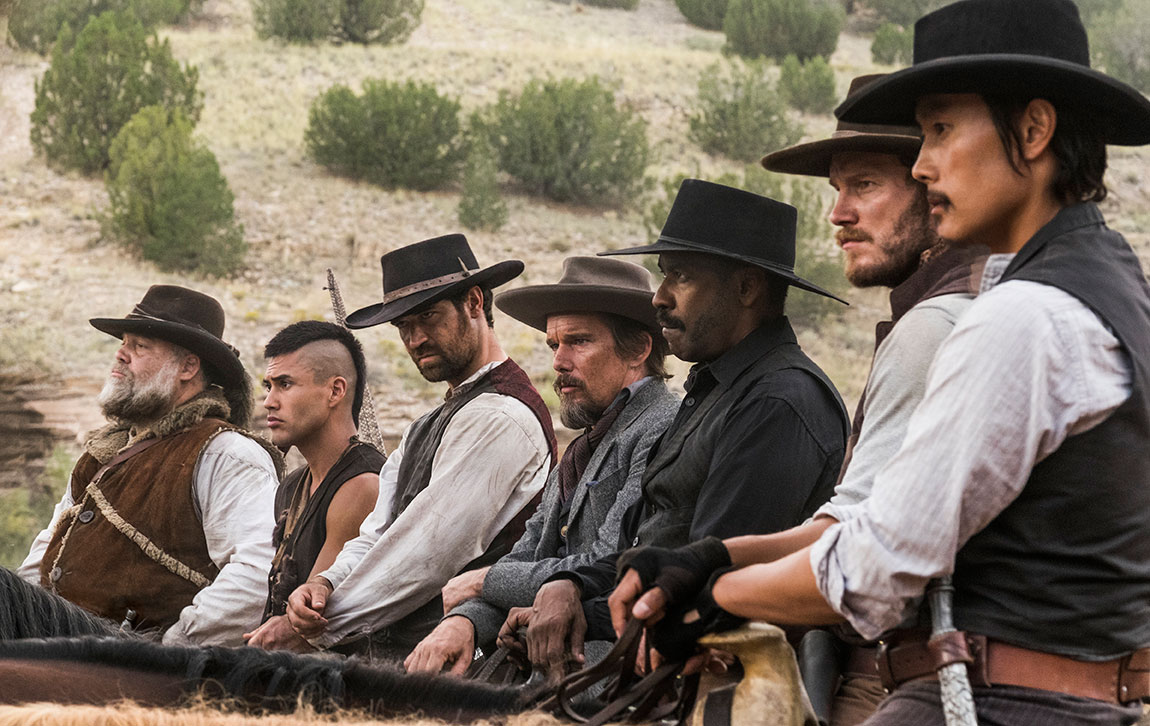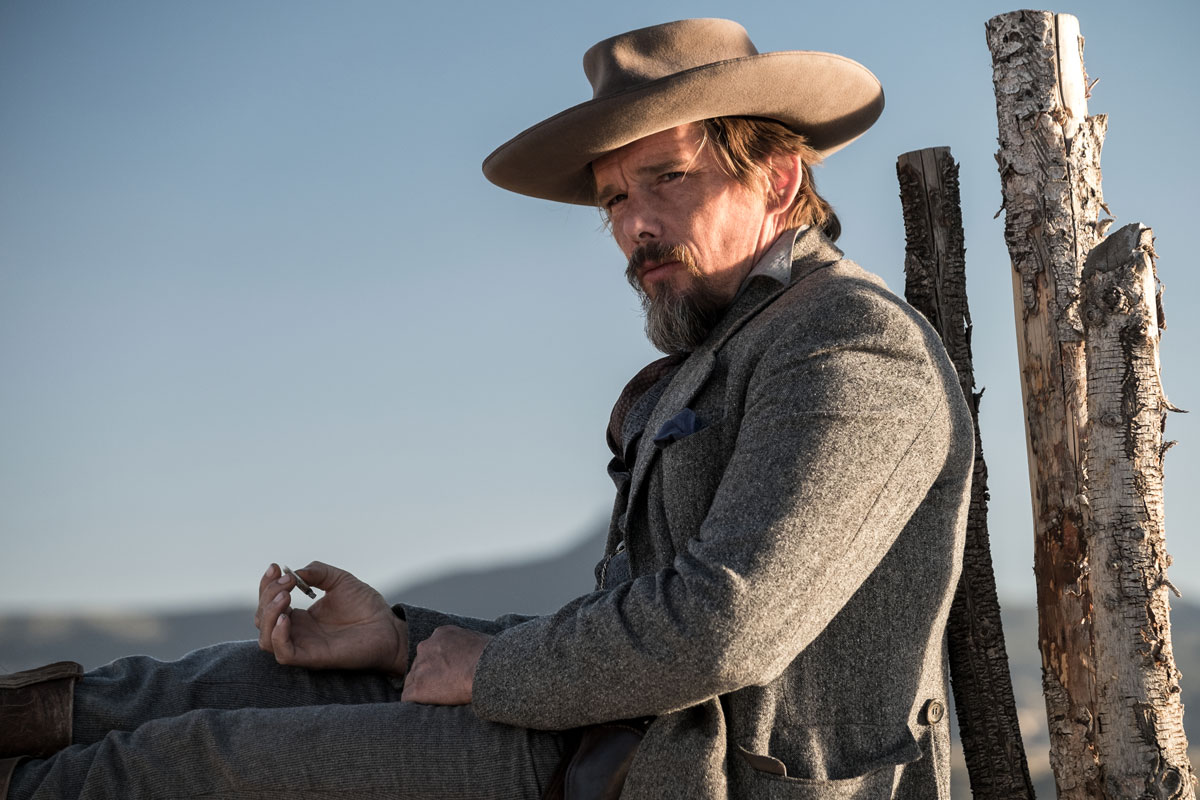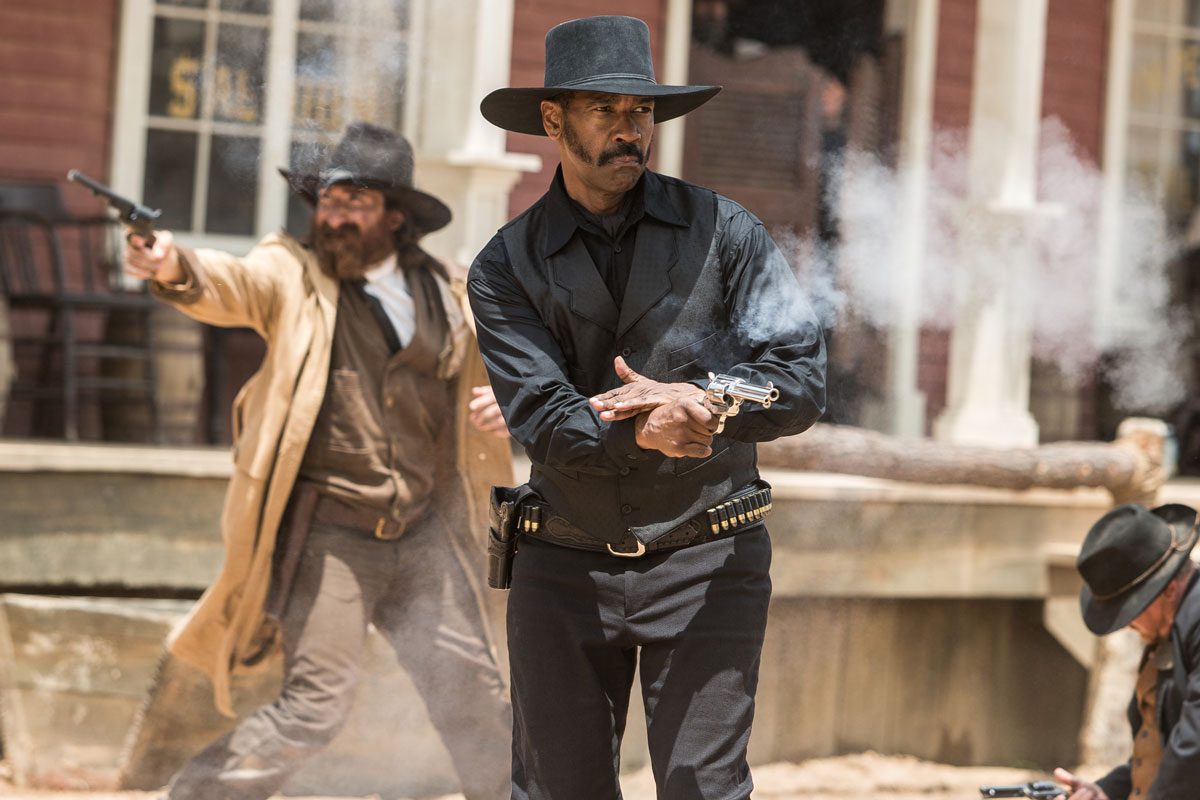A star-studded cast helps director Antoine Fuqua put a new spin on a western classic.
It’s the story of seven hired guns who come together to defend a tiny town against ruthless bandits. They may be outnumbered, but they’re committed to helping the helpless, and they’re willing to fight. The 1960 film The Magnificent Seven — a western reimagining of Akira Kurosawa’s Seven Samurai — became a bona fide classic on the strength of that premise and the characters who carried it out. Actors Yul Brynner, Steve McQueen, and Eli Wallach led a packed cast under the direction of John Sturges, with an iconic musical score by Elmer Bernstein.
It took Brynner only a few seconds on screen in the hat of his character, Chris Adams, to convince moviegoers that he was perfectly fit to play the indomitable hero who’d take on the movie’s vicious bandit leader, Calvera (Wallach). And his banter with McQueen’s Vin and with Horst Buchholz’s character, Chico, provided just the right amount of levity in an otherwise tense two-hour film.
The original Magnificent combined the classic narrative strengths of the western genre with surprisingly heartfelt performances by a diverse (for the time) cast of stars. Can that kind of western magic be reconstituted in modern-day Hollywood? Director Antoine Fuqua thinks so. Fuqua (Training Day) helms this September’s long-gestating remake of The Magnificent Seven (opening September 23), updated with plot twists and fresh characters. The script comes from screenwriters Richard Wenk (Fuqua’s The Equalizer) and Nic Pizzolatto (HBO’s True Detective).
Impressed by the scope and the innovative approach of the 1960 original, Fuqua still felt that a reboot of the enduring western classic would benefit from a more contemporary style. He’d grown up watching old movies with his grandmother and was aware at an early age of how westerns reflected where the country was socially and politically at the time. Politics and representation in Hollywood are still a work in progress, to be sure, but modern blockbuster films typically tout much more international flavor when it comes to casting and cultural references.
Watching one of the trailers for the new Magnificent, you’ll notice the quick-cut style, the contemporary music, the ramped-up action, and the inclusion of Asian and Native American actors in the film’s heroic core group.
“Westerns have changed so much over the years,” Fuqua says. “When John Wayne was making his early films, they were very wholesome. However, after World War II, he made John Ford’s The Searchers, a much darker look at the West, and his character, Ethan Edwards, became an unfulfilled wanderer.”
The Searchers dealt with the theme of racial prejudice, depicting Edwards’ inability to cope with his niece’s abduction by an Indian tribe. That theme stuck with the 50-year-old director, and he points out that an early scene in the original Magnificent Seven also tackles bigotry.
“As a kid, that opening few minutes had a huge effect on me,” Fuqua explains. “Yul Brynner’s and Steve McQueen’s characters met when they drove the hearse carrying the dead body of a young Indian up to Boot Hill to bury him.”

When Fuqua had an exploratory meeting with MGM about casting for the update, the first question asked was about who would step into the kinds of roles played so well by Brynner and McQueen. “I said, ‘I think it needs to be more of a modern event, and much more diverse.’ So when I mentioned Denzel Washington for the Yul Brynner role, there was a bit of a hush over the room for a lot of reasons,” Fuqua recently told Collider. “First was, ‘Do you think he would do it? A western?’ ”
The director believes it’s crucial to aim for diversity in the time-tested genre, but it was equally important to Fuqua that the movie not overemphasize that the lead character is black. “Let the reaction from the audience be whatever they bring into the theater,” he says. “Brynner was Russian, which was how I started thinking about this. Did anyone think about the fact that he was Russian or just the great actor, Yul Brynner?”
The remake’s cast is as accomplished and relevant as the original’s. Washington has already worked closely with director Fuqua on both Training Day and The Equalizer. Washington’s Training Day partner, Ethan Hawke, also pops up, along with Chris Pratt (Guardians of the Galaxy, Jurassic World) and Vincent D’Onofrio (Full Metal Jacket, Law & Order: Criminal Intent). South Korean actor Byung-hun Lee (G.I. Joe series), Native (Athabascan-Tlingit) actor Martin Sensmeier (Salem TV series), and Mexican-born star Manuel Garcia-Rulfo (Cake) round out the posse.

Haley Bennett (The Girl on the Train) plays Emma Cullen, a young townswoman whose plight brings the ragtag group together after an evil industrialist named Bartholomew Bogue (played by Peter Sarsgaard) shoots her husband and burns down a church. Washington plays a bounty hunter named Sam Chisolm, recruited by Bennett’s character to help protect her town against the industrialist’s violent takeover.
Fuqua involved Washington from the early stages of the movie’s production — he even asked for feedback on the updated script. The star’s remarkable film career had already garnered him two Oscar wins — one in 1990 for Best Supporting Actor in Glory, about African American soldiers in the Civil War, and the second 20 years later for Best Actor as rogue detective Alonzo Harris in Training Day. Washington was Fuqua’s first and only choice to lead the new Magnificent. “Denzel is the most amazing actor in the world and such a leader,” Fuqua says. “I couldn’t have asked for a better cast.”

Indeed, Fuqua surrounded himself with former collaborators — Hawke tells C&I that beyond his love for westerns, the chance to work with his Training Day costar and director was the primary draw for joining The Magnificent Seven’s cast. “Making Training Day was among the most formative experiences of my career, not just because of its reception, but because these two guys challenged me to be at my best,” Hawke says.
Of course, shooting The Magnificent Seven on location in New Mexico and Louisiana had its ups and downs. The horseback scenes were a source of adventure; the extreme heat was not. “We all did a ton of riding for the movie, mostly because it was so much fun. As for [wearing] the Western regalia, if it hadn’t been 109 degrees, I might have enjoyed it,” he says.
But authenticity was obviously important to Fuqua and his cast. Hawke understands well the challenge of walking a fine line between staying true to the western genre and freshening some aspects to appeal to modern audiences.
“It’s a genre that people have strong feelings about. You have to follow certain rules, but if you follow them all, you aren’t bringing anything original.”
From the October 2016 issue.














